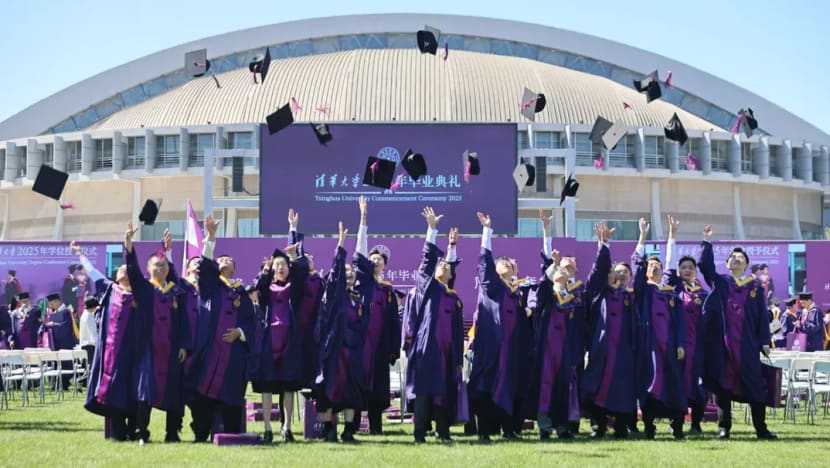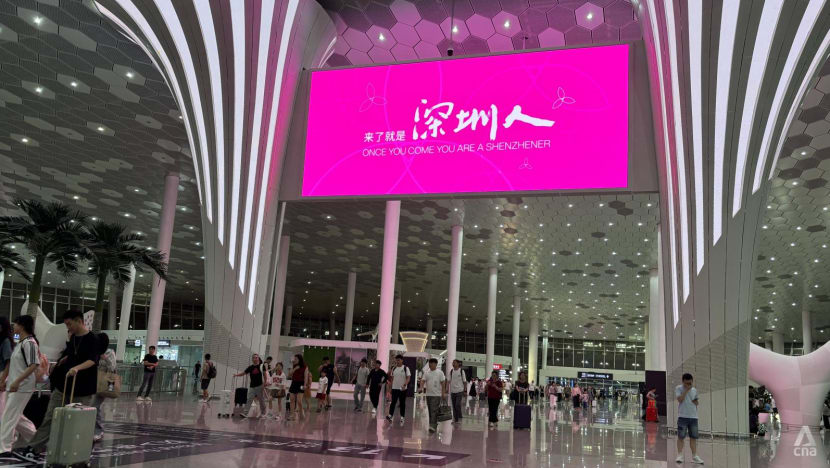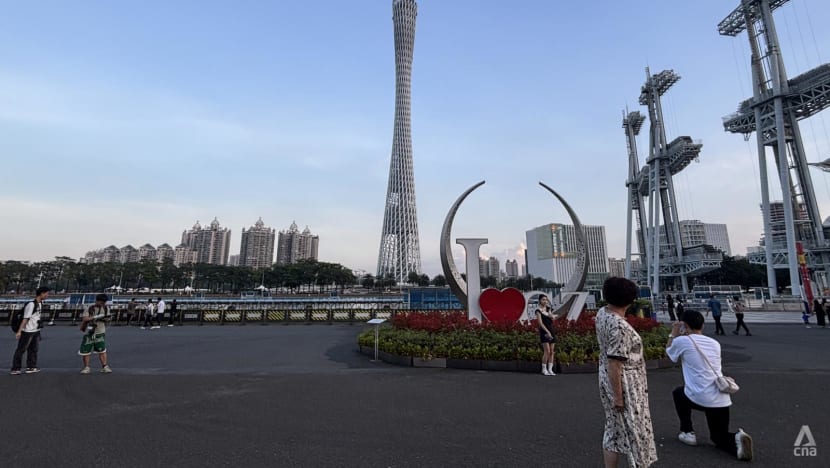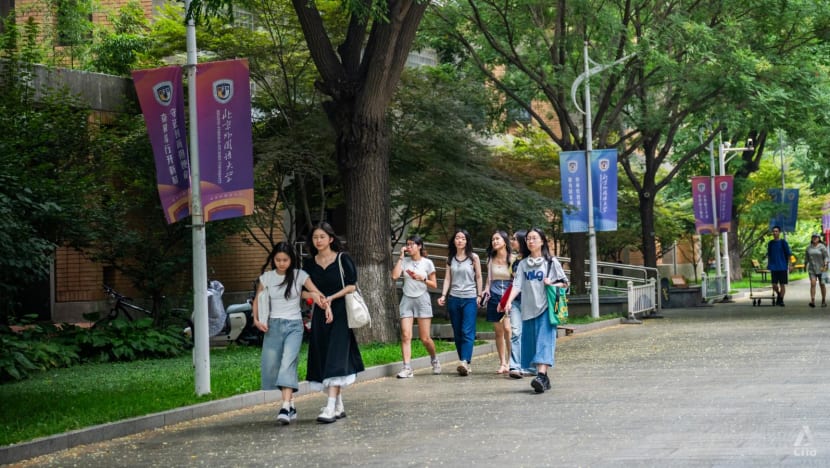‘Do I expect too much?’: China’s class of 2025 faces harsh job reality after graduation
A record 12.2 million university graduates enter China’s job market this summer - but for many, the future still feels out of reach.

Tsinghua University’s Class of 2025 toss their caps in celebration at their Beijing commencement. (Photo: IG/tsinghua_uni)

This audio is generated by an AI tool.
SHENZHEN: “I was confident at first but I feel numb now.”
For Ou Muoli, a 23-year-old graduate from Chongqing searching for work in Shenzhen, July is not just graduation season - it marks the fourth straight month of her relentless job hunt.
Ou, who graduated with a degree in international finance and trade from Henan University, knows what she wants: a decent monthly salary of around 5,000 yuan (US$697), full weekends off to rest and recuperate, and benefits like proper social insurance coverage.
Since March, she has submitted more than 100 job applications, both online as well as in person at graduate job fairs.
A few companies had gotten back, Ou said, but they were either teaching or sales roles she was not interested in - or expected early start dates, which wouldn’t work, she said, as she still had her thesis to complete.
“Roles in administration, human resources or marketing all require experience,” she said - a clear hurdle for someone like herself, fresh out of university.
MISMATCH BETWEEN DREAMS AND REALITY
Across China, as graduation ceremonies roll out from late June to early July, millions of students are tossing their graduation caps and bracing for what comes next.
This year, a record 12.2 million fresh graduates are set to enter China’s job market.
At first glance, the opportunities look bright. Just five fast-growing sectors - wind and solar, drones, AI, new energy vehicles and biopharma - are projected to need more than 12 million workers by 2025.

Meanwhile China's manufacturing sector alone faces a shortage of nearly 30 million workers this year.
More than 12 million new urban jobs have been added annually since the start of China’s 14th Five-Year Plan, Zhou Haibing, Vice Chairman of the National Development and Reform Commission, told a press conference on Wednesday (Jul 9).
Officials believe this year's cohort would provide a much-needed injection of talent - but the reality on the ground is starkly different, experts said, with jobs remaining unfilled and many graduates unemployed.
“The mismatch between available jobs and young people’s skills or aspirations is becoming increasingly pronounced,” said Zhao Litao, a senior research fellow at the National University of Singapore’s East Asian Institute, noting that many openings were in sectors that did not appeal to most graduates.
“So even if jobs exist, they are not roles that many young people want or can afford to take after factoring in personal skills and social status,” he said.
Others noted how labour-intensive industries like construction, manufacturing and logistics offered steady work but were still struggling to attract young talent.
Li Fei, a doctoral supervisor at Zhejiang University’s Institute for Science, Technology and Education Policy, said it was the result of a “mindset shift” among young Chinese graduates and jobseekers.
“Many prefer positions in emerging sectors or urban city jobs that feel more modern or socially valued, even if they come with greater competition,” he said.
Most young Chinese graduates would also turn away from factory jobs, Zhao said.
“They are looking for stability, decent pay and better work-life balance but (also face) a tough reality: slower economic growth, struggling businesses, rapid tech shifts and a job market that’s expanding fastest in low-skill, high-turnover service sectors.”
Even in future-facing sectors - from AI to clean energy - the future still feels frustratingly out of reach for many fresh graduates.
Cai Bao, a computer science graduate, thought his degree would be in demand but he soon found that much of what he had majored in did not match what companies were looking for.
The 22-year-old studied at the North University of China, a provincial public school in Shanxi province - and has chronicled his arduous job hunt journey on Chinese social media - with videos of his experiences amassing over 21,000 views on apps like Douyin and Xiaohongshu.

He submitted nearly 1,000 job applications and followed up with HR company reps repeatedly - saying applications submitted through job portals and company sites rarely got traction.
“We learnt coding, cybersecurity, embedded systems - all from outdated slides,” he said, quipping that such skills, if listed on a résumé, would immediately reveal how behind they were: “HR might just skip you.”
Deep-rooted mismatches persist between what schools teach and what industries need.
Cai also shared his struggles with discrimination. Coming from a non-prestigious Chinese university, he said, often meant doors stayed closed.
“There will be interviews but almost no chance of getting in,” he said.
STUCK AT THE STARTING LINE
In May, nearly 15 per cent of youth aged 16 to 24, and around 7 per cent of those aged 25 to 29 were unemployed - marking the third consecutive monthly decline, but still stubbornly higher than the same period last year.
This suggests that China’s job market remained under intense pressure ahead of this year’s summer graduation season.
For 22-year-old Xu Yiling, who graduated in May with a degree in applied economics from the Chinese University of Hong Kong, Shenzhen (CUHK-SZ), the dilemma wasn’t landing a job - it was whether to work at all.
Only 15 per cent of her 2025 cohort planned to enter the workforce directly, according to CUHK-SZ.
Rather than face the cutthroat job market, many of her peers opted to pursue further studies at top overseas universities.
“If I couldn’t find a satisfactory job at the time, I would have furthered my studies instead,” she told CNA.
Over the years, she focused her time and energy refining her CV, researching companies and preparing for interviews - sometimes spending up to 15 hours a week.
She also gained internship experience through stints at Tencent, a US consulting firm, and a non-profit project.
Xu sent out 80 applications in total and landed three job offers - accepting a strategic planning manager position at Chinese smart tech corporation Vivo, headquartered in Dongguan that designs and develops smartphones, accessories and software.
“It felt like everything flowed naturally, like how it was meant to happen,” she said.
Still, she knows she’s among the lucky few. Many of her friends are still job hunting - sending out CVs week after week, often without even a reply.

Zhou Yun, an assistant sociology and Chinese studies professor at the University of Michigan noted that some Chinese youth had been delaying their job search, choosing instead to explore alternatives.
But taking time off isn’t a luxury everyone can afford. For those without financial support or fallback options, waiting simply isn’t an option.
“For young adults without a robust social and familial safety net, the precarity of unemployment and underemployment is further intensified,” said Zhou.
At the same time, while furthering one’s studies might provide some short-term relief, it could worsen long-term mismatches.
“We’re seeing a mismatch where highly educated talent ends up in low-skill jobs,” said Chen Jie, a professor and Associate Dean for Graduate Studies and Research at the School of Humanities and Social Science at CUHK-SZ.
“Over time, this can dampen innovation and fuel anxiety, with trends like lying flat and involution affecting social stability and mobility,” he added.
Job opportunities after completing postgraduate studies also remain limited, Li said.
GOING THE DISTANCE FOR A JOB
Location is a key consideration for many graduates, experts said.
First-tier cities like Beijing, Shanghai, Guangzhou and Shenzhen are flush with applicants and opportunities but regions in central and western China lag significantly behind.
Shenzhen-based tech giant Tencent launched its largest-ever hiring drive, pledging to open 28,000 internship roles over three years.
For 2025 alone, 10,000 positions will be offered, with over 60 per cent in technical fields such as AI, cloud computing and digital content, the company said.

Young jobseekers have also been eyeing work in China’s Greater Bay Area (GBA), a high-growth megalopolis project comprising nine southern Chinese cities, along with Hong Kong and Macau.
With its combined gross domestic product (GDP) of over 14 trillion yuan recorded in 2023, accounting for around one ninth of China's total, the GBA has been going all out to attract young graduates and jobseekers across the country.
Throughout this year, several job fairs were hosted across Guangdong province as part of the “One Million Talents to Guangdong” initiative - welcoming young talent to work in 20 key sectors like AI, robotics and advanced manufacturing.
Perks like generous employee subsidies of between 5,000 to 10,000 yuan were rolled out for those working in designated GBA cities for at least six months.
Housing benefits were another major draw, with free accommodation for up to 30 days offered to jobseekers relocating from outside the designated cities.
“Subsidies sound good in theory and wealthier local governments can use them to attract graduates, giving them an edge over debt-ridden regions,” said Zhao, who also noted that few places could afford such approaches.
“A few thousand yuan or a short-term rent break won’t fix the deeper problem,” he said.
“There just aren’t enough quality jobs.”
Other experts agree that short-term incentives alone are not enough to address the scale and complexity of China’s youth and graduate unemployment crisis.
“We need to avoid one-size-fits-all reforms or blindly expanding programmes that ultimately waste resources,” said Chen.

Zhen Rong, a deputy manager in the human resources department at China Chengtong, a state-owned logistics firm, said an unfavourable job market made finding suitable jobs “genuinely tough” for fresh graduates.
“Many don’t know what they want or are suited for and often have unrealistic expectations,” said Zhen.
“It’s not that jobs don’t exist, it’s that finding the right fit is difficult.”
“There are no quick fixes,” said Zhao. “We need to rethink how we train and support graduates and match (them with) real opportunities.”
Chen advocated for more open communication between universities and employers.
“We need stronger school-enterprise ties, internships, joint courses, industry mentors, to help students build practical skills before they enter the workforce,” said Chen.
For now, many fresh graduates remain in limbo.
Ou continues to turn down demanding jobs that require six-day workweeks, unpaid overtime, and working hours that stretch past 11pm.
Meanwhile, she checks job sites daily, hoping for something good to land.
“Do I expect too much - that’s why I can’t find a job?”
She has since lowered the bar and her expectations.
“Now … (maybe) I’ll accept a sales role,” she said.



















